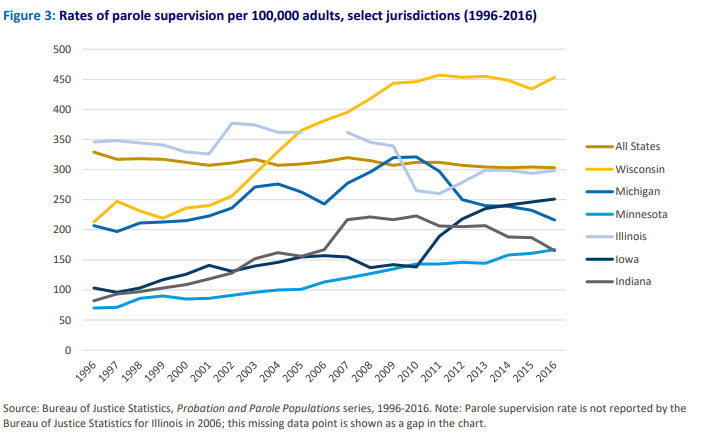Study Calls for Probation, Parole Reform
Wisconsin’s system is “wasting money and wasting lives,” should learn from other states.
Wisconsin keeps more people on parole longer than most other states, and more parole terms end with incarceration here than in other states, according to a report released Tuesday by the Columbia Justice Lab.
“Our report contains troubling findings that Wisconsin is wasting money and wasting lives by supervising and violating thousands of people not for new crimes, but for technical violations of supervision,” Vincent Schiraldi, co-director of the Justice Lab and former Commissioner of New York City Probation, said in a prepared statement. “Wisconsin should now follow the example of dozens of states and focus community supervision resources on those most in need of it, stop returning people to prison for ‘ticky-tack’ rule violations, and use the savings from such reforms to fund programs and opportunities that help people turn their lives around.”
Below are highlights from the report, “The Wisconsin Community Corrections Story.” The language generally taken straight from the document (omitting citations).
The facts
- As of 2016, there were 64,900 people under either probation or parole supervision in the state, just shy of the population of Oshkosh.
- In 2016, 988 of every 100,000 adults in Wisconsin were under probation supervision, and another 453 adults in that 100,000 were under parole supervision.
- Wisconsin’s probation rate remains below the national average. Probation supervision rates in Wisconsin have roughly followed the national trend, declining slightly over the past two decades.
- Wisconsin’s parole rate is about 1.5 times higher than both its next highest neighbor (Illinois, at 298 per 100,000 adults), and the national state average (303 per 100,000 adults). Nationally, Wisconsin has the seventh-highest parole supervision rate. (Parole includes extended supervision.)
- After remaining relatively flat through the late 1990s, the parole supervision rate in Wisconsin started rising sharply in the early 2000s, and is still trending upward, according to the most recent available data.
- Truth in sentencing, with the implementation of extended supervision, played a significant role in the increasing numbers of people under community supervision.
- The average parole term in Wisconsin in 2016 was about 38 months, 1.7 times greater than the average across all states (22 months). Wisconsin ranked third nationally in length of expected parole terms.
- Wisconsin has disproportionately high rates of probation and parole, especially for Black and Native American men. One in eight Black men is under community supervision, more than five times the rate of white men in Wisconsin. One in 11 Native American men is under community supervision, four times the rate of white men in Wisconsin. Black women are supervised at over three times, and Native American women at over six times, the rate of white women.
- Thirty-nine percent of the people who left parole in Wisconsin in 2013 did so because they were incarcerated, while nationally only 28 percent of state parole exits were to incarceration.

Estimated average length of stay under parole supervision in months, select jurisdictions (1996-2016)
- Seventy-five percent of people in Wisconsin who ended parole through incarceration were not convicted of a new crime; nationally, that figure was 57 percent.
- Wisconsin prison admissions for revocation without a new sentence hit 3,442 people in 2017, or 37 percent of all admissions that year.
- In 2010, Wisconsin spent 12 percent more on corrections per resident ($267) than the national average ($239), and more than 40 other states. When compared to neighboring states, Wisconsin spent 6 percent more on corrections per state resident than Michigan and 90 percent more per resident than Iowa. If spending on corrections per resident in Wisconsin were equal to that of Iowa, Wisconsin would spend $728 million less on corrections each year.
- Incarceration at the Milwaukee Secure Detention Facility (MSDF), built to house people on probation or parole, overwhelmingly impacts people of color. According to the most recent data from the Bureau of Justice Statistics, 45 percent of people incarcerated in Wisconsin self-identify as white and 41 percent identify as Black. In contrast, 33 percent of people incarcerated at MSDF identify as white and 65 percent identify as Black.
- In Milwaukee, black residents make up 64 percent of all people under community corrections supervision. Yet, black inmates made up 76 percent of all people incarcerated at MSDF for revocations at the end of 2017, and of those, 88 percent were incarcerated without a new conviction.
- What we should do:
- Close the Milwaukee Secure Detention Facility. Best practice indicates that Wisconsin should stop incarcerating people for technical violations, and instead increase due process and alternatives to holding people preadjudication for suspected violations. This should be paired with incentives to improve compliance and rehabilitation, and alternative sanctions if a person is found to be in substantial violation.
- Locate Alternative to Revocation programs in the community, not within the Milwaukee Secure Detention Facility.
- Reduce probation and parole terms to between 1 and 3 years, except in rare circumstances. Reducing community supervision terms would allow Wisconsin’s Division of Community Corrections to focus on individuals for the period of time they are at the greatest risk of offending, rather than exposing supervised people to the risk of technical violations long after they have committed their original offense.
- Eliminate or strictly limit incarceration as a response to technical violations, and increase due process protections for people under community corrections supervision. Whether in the form of “holds” while a suspected violation is investigated or revocation of a person’s supervision, incarceration is an outsized and highly disruptive response to behavior that is not criminal. As research on pretrial detention has shown, even short periods of incarceration can be highly disruptive to housing, employment, and family ties. Provide for “merit time” or “earned compliance credit,” and allow for early termination for sustained compliance, for probation, parole, and incarceration.
- Realign savings to community programs.
Gretchen Schuldt writes a blog for Wisconsin Justice Initiative, whose mission is “To improve the quality of justice in Wisconsin by educating the public about legal issues and encouraging civic engagement in and debate about the judicial system and its operation.
























Thanks for covering this.